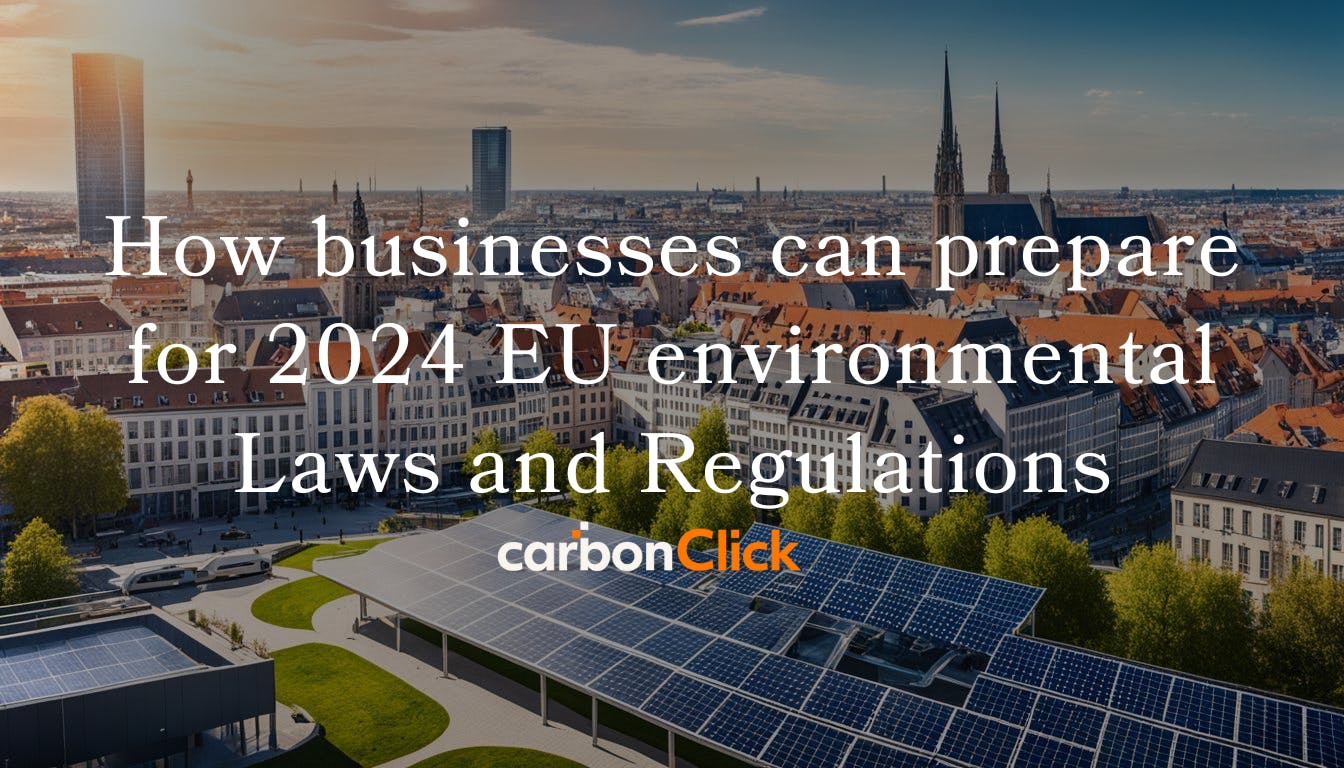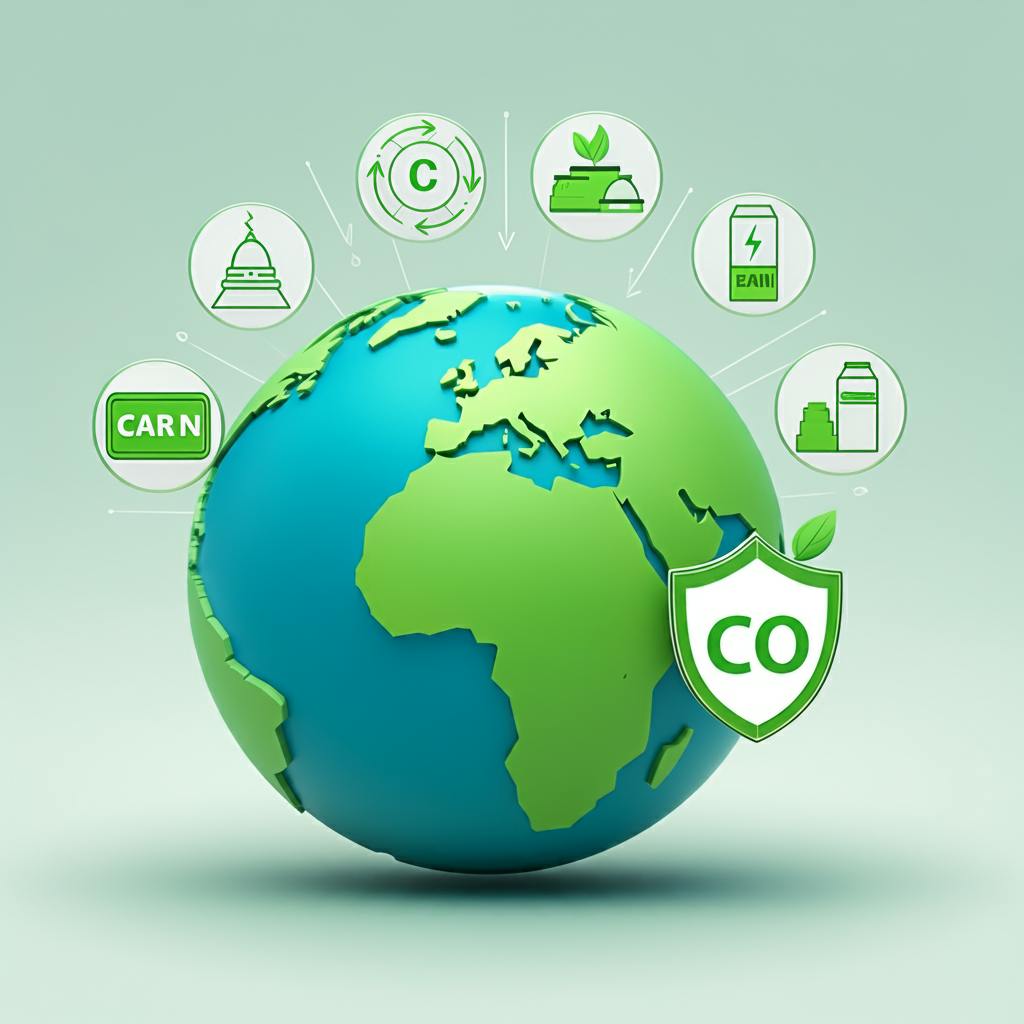Go the extra mile
Towards a cooler planet
How businesses can prepare for 2024 EU environmental Laws and Regulations
1 November 2022
Did you know the European Union's new directive could change global trade? It sets tough environmental standards. These rules aim to tackle carbon emissions, water quality, and biodiversity. They also affect businesses inside and outside the EU.

How businesses can prepare for 2024 EU environmental Laws and Regulations
Starting in January 2024, companies will face a new set of rules. This includes the Carbon Border Adjustment Mechanism (CBAM) and the Digital Product Passport. The Ecodesign for Sustainable Products Regulation is part of this new law.
Key Takeaways
- The Carbon Border Adjustment Mechanism (CBAM) aims to prevent carbon leakage by setting a carbon price on imports of specific goods from outside the EU.
- The Drinking Water Directive sets new standards for water quality, effective January 2023.
- The Biodiversity Strategy for 2030 introduces binding targets for habitat and species restoration.
- The Packaging Reduction Regulation mandates recyclable packaging and promotes bio-based plastics.
- The directive approved in January 2024 empowers consumers by banning unsubstantiated environmental claims and promoting genuine sustainability labels.

The Carbon Border Adjustment Mechanism (CBAM)
The EU's Carbon Border Adjustment Mechanism (CBAM) demonstrates the region's strong stance on reducing carbon emissions and preventing carbon leakage. It represents a significant shift in how the world approaches carbon pricing and aims to ensure companies across various sectors adhere to the CBAM rules.
Overview
The CBAM was established to prevent carbon leakage in the EU. It imposes a carbon price on imports of certain high-carbon products, including iron, steel, aluminium, cement, fertilisers, electricity, and hydrogen. Companies can receive deductions if they have paid a carbon price elsewhere, thus promoting fair trade and protecting the environment.
Implementation Timeline
The CBAM will be phased in gradually. From 1 October 2023 to 31 December 2025, companies will begin reporting their greenhouse gas emissions without yet needing to buy and surrender certificates. The full regulations will come into effect in 2026, covering additional sectors and requiring strict EU ETS compliance.
Key milestones include:
- 1 October 2023: Companies must start adhering to the reporting rules.
- 1 January 2025: Only the EU method for calculating emissions on imports will be used.
- 1 January 2026: Certificate trading and registration for importers of CBAM goods begin.
- 31 May annually: Deadline for submitting the annual CBAM declaration.
Impact on Businesses
The CBAM will significantly impact businesses. Companies dealing with CBAM goods will need to enhance their data collection to understand their carbon footprint. They must also establish systems to comply with CBAM rules and reduce emissions.
Companies that do not secure enough emission allowances will face fines, pushing businesses to manage their carbon emissions carefully. The CBAM also supports the EU's goal to cut emissions by 55% by 2030, influencing the future of carbon pricing in the EU.
Collaborating towards CBAM compliance could transform trade practices, fostering a sustainable and environmentally responsible global market.
The Drinking Water Directive
The Drinking Water Directive is a key EU law. It ensures that drinking water quality across the EU remains excellent. Adopted in December 2020, it reflects the EU's commitment to public health through stringent water safety regulations. Let's explore the goals and how businesses can meet them to comply with EU water quality standards.
Goals and Objectives
The primary goal is to ensure that everyone has access to safe drinking water. It addresses pollutants such as microplastics, with a Drinking Water Watch List established on 19 January 2022 to monitor these substances.
It also seeks to reduce the risk posed by materials in contact with drinking water. New hygiene standards will come into effect from 31 December 2026.
- Implementation of EU water quality standards in accordance with WHO advice.
- Regular checks and updates of the Drinking Water Watch List.
- Setting and maintaining high-quality standards for materials in contact with drinking water.

Businesses should start taking steps to meet the EU's new hygiene standards by 2026.
Steps for business compliance
Businesses must adhere to the Drinking Water Directive to ensure their water is safe. This involves closely monitoring and complying with quality regulations. By 16 May 2024, the EU will provide a method for measuring microplastics in drinking water, assisting businesses in making necessary adjustments.
- Conduct regular checks on water quality.
- Update your systems to meet new material standards.
- Use the recommended method to detect microplastics.
Following the Drinking Water Directive goes beyond mere compliance. It aims for a sustainable, health-focused future. The goal is to establish a safe and equitable water supply system, which helps protect public health across the EU and enhances the quality of life for its citizens.

The Biodiversity strategy for 2030
The European Commission has adopted a new EU Biodiversity Strategy for 2030 as part of the European sustainability Deal. This plan aims to halt biodiversity loss and protect ecosystems while enhancing the resilience of EU protected areas.
The strategy sets targets and encourages businesses to participate. It aims to strengthen Europe's resilience to climate change and support a recovery from the COVID-19 pandemic in a sustainable manner.
Strategic Targets
The EU Biodiversity Strategy has set ambitious targets to improve climate resilience and protect ecosystems. Key initiatives include:
- The Nature Restoration Law, effective from 15 August 2024, which aims to restore 20% of degraded ecosystems by 2030 and all by 2050, focusing on ecosystems with high carbon storage potential.
- Expanding EU protected areas to cover 30% of EU land and sea by 2030, including creating new protected zones and enhancing existing ones.
- Member States will prepare and implement national Nature Restoration Plans, assessing the social and economic impacts, benefits, and costs, covering various ecosystems such as land, coast, fresh water, and sea.
- Monitoring and improving the populations of common birds and butterflies, which are key indicators of biodiversity health across Europe.
Business Involvement
Businesses in the EU must adapt to new regulations from the EU Biodiversity Strategy. Key points for businesses include:
- Monitoring the Nature Restoration Law and adjusting strategies as necessary. This law complements climate policies to enhance food security and ecosystem services.
- Supporting habitat conservation by participating in or backing restoration projects. For example, the Wolf Fencing Team Belgium demonstrates how citizens and businesses can contribute to biodiversity.
- Adopting nature-based solutions and sustainable practices that align with the EU's biodiversity objectives. This involves reducing environmental impacts and enhancing Europe's resilience to climate change.
By aligning with the EU Biodiversity Strategy, businesses can play a crucial role in protecting ecosystems and supporting Europe's sustainable recovery, significantly contributing to Europe's resilience against climate change.
Packaging Reduction Regulation
The EU's new packaging waste regulation is set to transform the market, marking a shift towards more sustainable packaging practices. This will impact millions of companies and citizens, encouraging them to adopt more environmentally responsible practices.
Businesses have 18 months to adjust their methods for producing and distributing products. They must monitor the packaging they use across 22 categories and report annually to national registers. Packaging that cannot be effectively recycled will be prohibited.
EU Recyclable Packaging Criteria
The regulation promotes sustainable packaging by supporting bio-based plastics and establishing recycling goals. By 2030, packaging must be designed for easy recycling. By 2035, it should be suitable for large-scale recycling. Imported packaging must also comply with these standards.
Certain single-use plastics and PFAS in food packaging are banned, promoting healthier alternatives. From 2030, packaging will be lighter and less bulky, with regulations concerning empty spaces in packaging.
The amount of recycled content in plastic packaging will increase over time. Companies must label their packaging with information about its contents and its potential for reuse, aiding consumers in making informed choices.
The regulation aims to enhance reuse by 2030, with a focus on refill and reuse. Companies selling beverages and takeaways must offer at least 10% of their products in reusable containers, supporting the circular economy.
Understanding the EU packaging waste regulation is essential for compliance. These changes are pivotal in reducing packaging waste and encouraging the use of new, sustainable materials, while addressing both environmental and economic objectives.


Ecodesign for Sustainable Products Regulation (ESPR)
The Ecodesign for Sustainable Products Regulation (ESPR) represents a significant advance towards a more sustainable future under the European sustainability Deal. It will come into effect on 18 July 2024 and encompasses a broader range of products and criteria than previously. The ESPR aims to extend product lifespans, enhance ease of repair and recycling, and reduce energy consumption and costs for consumers.
Key Aspects
The ESPR focuses on sustainable design principles. It mandates Life Cycle Assessments to minimise environmental impact. Products must be designed to reduce waste, both before and after sale, supporting the European sustainability Deal's objectives for a circular economy.
Impacts on Consumer Goods
Consumer goods will be significantly impacted by the ESPR. It promotes the production of durable and easily repairable products, enabling longer use and cost savings for consumers. In 2021, similar regulations reduced energy use by 10% and saved consumers 120 billion euros.
Digital Product Passport
The Digital Product Passport (DPP) is a central feature of the ESPR. It functions as a digital identifier for products, providing information on sustainability aspects. The DPP includes details on performance, materials, repair options, and environmental impact, enhancing product transparency and contributing to the European sustainability Deal's goals.
Empowering consumers for the sustainable Transition
The EU has introduced a new directive to help consumers make more sustainable choices. It aims to increase market transparency and supports the European Sustainability Deal by addressing misleading environmental claims and premature product obsolescence.
Prohibited Claims
Companies are now prohibited from making false environmental claims such as 'sustainable' or 'biodegradable' without substantiation. This regulation is part of the Consumer Rights Directive EU and aims to build trust and combat greenwashing. The directive bans ten misleading practices, including vague environmental claims.
Empowering Consumers for the Sustainable Transition
Sustainability Labels Regulation
Only certified sustainability labels are permitted. This ensures accurate information on product durability and repairability and clarifies product guarantees, helping consumers make informed choices.
Ban on Premature Obsolescence Practices
The directive also addresses the issue of products becoming obsolete too quickly. It bans false durability claims and misleading updates. Companies must provide information on product longevity and sustainable delivery options.
This directive underscores the importance of informed consumers and reliable information. It represents a significant step towards more sustainable business practices in the EU.


Key Dates and Compliance Deadlines
Knowing the enforcement dates for EU regulations is crucial for businesses operating under European laws. Several important rules and deadlines are approaching, and businesses need to prepare accordingly.
December 2024 is a significant date on the EU environmental compliance calendar. It marks the deadline for large businesses to comply with the EU Deforestation Regulation (EUDR), which aims to halt deforestation linked to products such as soy, cattle, and palm oil.
EU Regulation Enforcement Dates
By June 2025, Small and Medium Enterprises (SMEs) will also need to adhere to the EUDR standards. It is essential to comply with these regulations to avoid substantial fines.
In 2025, the Corporate Sustainability Reporting Directive (CSRD) will extend to more companies, and by 2026, it will encompass an even broader range of businesses. This means companies with more than 250 employees, over €50 million in sales, or more than €25 million in assets will be required to report on sustainability.
The EU ESG regulations aim to reduce greenhouse gas emissions by at least 55% by 2030, significantly impacting corporate compliance timelines and sustainability practices.
Key Deadlines for EU Regulations
The June 2026 deadline for the EU's "women on boards" directive is also significant. It aims to ensure that at least 40% of top roles at major listed companies are held by women. These regulations go beyond mere compliance, demonstrating a commitment to diversity and inclusion.
With over 2,400 ESG regulations worldwide impacting businesses, staying informed about EU regulation enforcement dates is crucial. Incorporating these deadlines into strategic planning will help businesses adapt to EU regulations, maintaining a strong position in the European market.
How these Laws impact Global Trade
New laws set to come into effect by the end of 2024 will transform global trade and business. These regulations aim to make trade more sustainable by imposing high standards for imports to the EU, ensuring that products do not contribute to deforestation.
EU Market Access
The new EU rules will alter how businesses trade within the EU. Companies must adhere to these strict regulations to avoid substantial fines and reputational damage. For instance, the Deforestation Regulation requires that products originate from areas where deforestation has not occurred since 31 December 2020. This impacts commodities such as cattle, coffee, and soy.
Compliance with these rules necessitates robust due diligence systems. Businesses must assess and address potential risks. This is already significant, with 62% of Brazilian agribusiness exports to the EU being at risk, valued at over $15 billion. This underscores the scale of changes required to meet EU standards.
International Business Adaptations
International companies must adapt to these sustainable trade regulations. They need to audit and improve their supply chains to meet the EU's stringent environmental criteria. Products such as palm oil, cocoa, and rubber will require enhanced traceability to be accepted.
Countries like the UK are also implementing similar regulations, reflecting a global push towards sustainability. Adhering to these rules is essential for maintaining competitiveness and demonstrating commitment to environmental stewardship. These changes present an opportunity for businesses to prove their responsibility and contribute positively to the environment.


Challenges for SMEs
Small and medium enterprises (SMEs) are struggling to comply with the EU's stringent environmental regulations. The European Commission's SME Performance Review highlights their efforts to support SMEs, but the costs of adhering to these regulations are significant, resulting in additional work and expenses.
There are concerns about how well smaller businesses can manage these rules. Over 80% of Europe's 700 manufacturing plants are operated by SMEs, but their varying sizes mean they often face difficulties with the costs and logistics involved.
Compliance Costs
A major issue for SMEs adapting to EU regulations is the financial burden of compliance. The report on European SMEs from 2008 to 2024 underscores the size and importance of these businesses, but the cost of implementing changes can have a severe impact on their financial health.
Administrative Burdens
SMEs also contend with substantial challenges related to the administrative demands of EU regulations. The complexity of the rules, as noted by A.I.S.E. in their review of the Detergents Regulation, requires integration with other laws, which is challenging and diverts significant time and effort from their core activities.
Ultimately, it is crucial to recognise the significant challenges SMEs face. They require support, such as clear guidance and financial assistance, to adapt to EU regulations. With increasing consumer demand for sustainable products, SMEs must overcome these obstacles to thrive and achieve sustainability.
Conclusion
The EU's new environmental laws for 2024 represent a significant step towards a more sustainable future. They will alter business operations, consumer purchases, and international trade. The Carbon Border Adjustment Mechanism and the Biodiversity Strategy for 2030 illustrate the EU's strong commitment to enhancing environmental sustainability.
Businesses, whether large or small, face both challenges and opportunities with these regulations. Companies with over 500 employees must comply with the Corporate Sustainability Due Diligence Directive. All businesses will need to ensure their packaging is recyclable by 2030. The EU CO2 market and the UK Carbon Border Adjustment Mechanism (CBAM) by 2027 demonstrate the global impact of these rules.
Adapting to these laws is essential for maintaining a competitive edge in the market. It is not just about compliance; it is about leading in sustainable business practices. This approach ensures businesses remain competitive while supporting a sustainable future for all.
Looking ahead, staying informed and proactive is crucial. With important deadlines and stringent regulations approaching, businesses must adapt swiftly. This will help them meet legal standards and contribute to a sustainable environment for future generations. Together, we can turn these challenges into opportunities for a more sustainable world.
FAQ's
What are the new EU environmental laws and regulations coming in 2024?
The EU is introducing new laws in 2024 to improve water quality, reduce carbon emissions, and protect nature. These laws include the Carbon Border Adjustment Mechanism (CBAM), the Drinking Water Directive, and the Biodiversity Strategy for 2030. There's also the Packaging Reduction Regulation and the Ecodesign for Sustainable Products Regulation (ESPR).
What is the Carbon Border Adjustment Mechanism (CBAM)?
CBAM is a new rule designed to prevent carbon leakage by imposing a carbon price on imports. It targets products such as iron, steel, cement, and aluminium that are significant emitters of carbon. Companies can receive deductions if they have already paid a carbon fee elsewhere.
When will the CBAM be fully implemented?
CBAM will be fully operational by 2026, following a phase-in period.
What is the Drinking Water Directive and what changes does it introduce?
The Drinking Water Directive sets new standards for drinking water, in line with WHO guidelines. It aims to address pollutants and introduces a Drinking Water Watch List. Companies must ensure their water meets these standards, and materials in contact with drinking water must adhere to new EU hygiene regulations starting in 2026.
What are the goals of the Biodiversity Strategy for 2030?
The Biodiversity Strategy for 2030 aims to halt biodiversity loss and restore damaged ecosystems by 2030. It includes plans to increase protected areas, restore nature, and implement a Nature Restoration Law.
How will the Packaging Reduction Regulation impact businesses?
The Packaging Reduction Regulation will mandate more recyclable packaging and ban harmful chemicals in food packaging. It encourages the use of bio-based plastics and introduces new sustainability rules. All packaging sold in the EU will be affected.
What are the main aspects of the Ecodesign for Sustainable Products Regulation (ESPR)?
The ESPR focuses on making products more durable, repairable, and recyclable. It extends the Ecodesign approach to a wider range of products, altering their design and end-of-life management. It also introduces a Digital Product Passport for easy access to information on sustainable product attributes.
How will the new EU laws empower consumers for the environmental transition?
New regulations will ban unsubstantiated environmental claims such as 'eco' and 'biodegradable'. Only officially approved sustainability labels will be permitted. Harmonised labels for longer product guarantees will be introduced, and practices such as planned obsolescence will be prohibited.
What are the key dates and compliance deadlines for these new regulations?
Important dates for implementing rules like CBAM and the Drinking Water Directive are established. Staying informed about these deadlines is crucial to avoid penalties for non-compliance.
How will the new laws affect access to the EU market for global trade?
These laws set environmental standards for imports, encouraging global adherence to environmental practices. Companies worldwide must adapt their products and supply chains to comply with EU regulations, creating opportunities for success in the sustainable market.
What challenges might SMEs face regarding these new regulations?
SMEs may encounter difficulties with the costs and administrative requirements associated with complying with these regulations. The financial and logistical burdens of meeting EU standards are a concern. Support and clear guidance will be essential for helping SMEs navigate these new laws.
17 South Street
Auckland 1010
New Zealand
info@carbonclick.com- -
- X
Sign up. Be inspired. Get clicking.
Subscribe now to stay up to date with CarbonClick, carbon offsetting and climate action.
By signing up you agree to our Privacy Policy.


